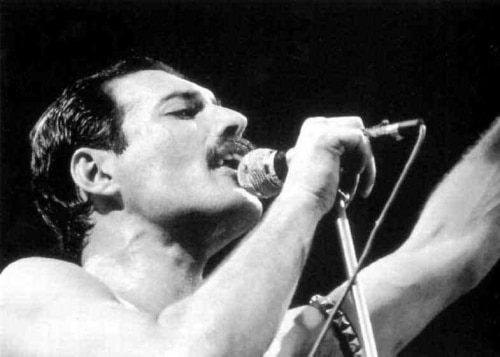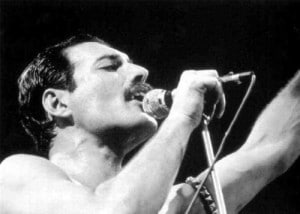
After the gig, apparently Freddie Mercury stormed into his dressing room, picked up a clothes iron and hurled it at a full-length mirror, smashing it to pieces.
Well, he’s obviously not superstitious! The outburst had been sparked by a faulty microphone on stage. Although the audience were unaware anything was wrong, Freddie blew his top.
To quote Freddie, ‘Some people can take second best, but I can’t. If you’ve got the taste for being number one, then number two isn’t good enough.’
Hard to imagine, but it’s 36 years since Freddie and his group Queen shot to the top of the charts with that seminal song Bohemian Rhapsody.
To mark the 40th anniversary of the band’s formation in 1971, a major Queen exhibition opens in London’s East End on February 25, called Stormtroopers In Stilettos: Queen, The Early Years. It documents the band’s first five albums and their rise to being global superstars.
Through photos and films, it recaptures that iconic live show performed to more than 150,000 people in Hyde Park in 1976 that cemented Queen’s success. And later this year filming will begin on a movie about Queen, starring Sacha Baron Cohen as Freddie.
Unmissable though the exhibition is, it can’t begin to give you a taste of what Freddie was really like. The flamboyant star died from AIDS on November 24, 1991, at the age of just 45.
But the real tragedy for me is that Freddie needn’t have died at all.
What struck me was the vocal power he possessed. It was this brilliance that led to the world-famous soprano Montserrat Caballe partnering him for their number one hit Barcelona in 1987.
Although Freddie was famous for the way he dominated a stage, he was entirely different in private. The showmanship was replaced by someone who was shy, suspicious and guarded his privacy with an obsessive tenacity.
There was even a period when he was afraid of meeting people as he thought they might be disappointed that he was not the larger-than-life person they saw on stage. ‘I don’t want to shatter the illusion,’ he said. ‘I’m a sort of chameleon. I think it’s a combination of a lot of characters. And I’m a person of extremes.’
Freddie prepared to go on stage by swigging down a few vodkas and he’d warm up his voice with a run of vocal exercises. His valet would have his stage clothes laid out for him. After one last puff on a cigarette, he would rush through his door to the stage to the cheers of Queen’s adoring fans. He was like a hurricane.
‘When I’m on stage, I become very different,’ he said. ‘There are no half measures. You have to be resilient to be a rock star, you can’t falter once.’
After buying a mansion in Kensington, Freddie liked nothing better than to surround himself with a group of friends. He preferred to throw dinner parties than go out to bars and discos in the way he did during Queen’s early days.
These gatherings always included his former girlfriend, the slim, quietly 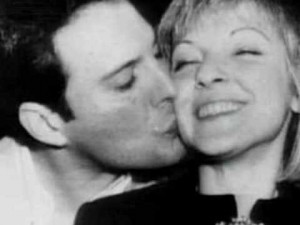
Some of his relatives and friends were surprised at this decision. While boyfriends came and went, Mary remained the one constant in his life.
Mary would be the one who would inherit his millions. ‘My life is extremely volatile,’ he said. ‘The only friend I’ve got is Mary. I don’t want anyone else. Over the years I’ve become bitter. The more you’re let down, the more you’re hurt. I feel I’m walking around with scars all over the place.’
Mary was 19 when she met him. She was working as the public relations officer for trendy London boutique Biba while Freddie and Queen’s drummer Roger Taylor ran a stall in the nearby Kensington Market selling old clothes and Freddie’s art.
‘We grew up together. It took about three years for me to really fall in love. I’ve never felt that way before or since with anyone,’ said Mary, who moved into a flat with Freddie in Victoria Road, Kensington.
For six years Freddie and Mary had a normal physical relationship. One night he told her that he thought he was bisexual, to which she replied, ‘No Freddie, you’re gay.’
They hugged each other. The time had come for them to lead separate lives, although Freddie assured her he would always be there for her. He bought her a $1,200,000 flat near his home, so that after splitting up they could continue to see each other.
Freddie confessed about Mary, ‘We still love each other. And if I go first I’m going to leave everything to her. Nobody else will get a penny, except my cats.’
In the event, Freddie left bequests to his family, his last boyfriend, Irish born Jim Hutton, who he’d treated to a house in Ireland, was left a large sum of money, his valet received around $1,000,000 and his chef was also remembered. In his search for love, he once revealed, ‘I’ve tried relationships on either side, male and female. But all of them have gone wrong. I don’t think anyone can put up with me. I eat people and destroy them. I just want it all my own way, but doesn’t everybody? That doesn’t mean I’m not giving. I demand a lot, but I do give a lot in return.’ He certainly cared about his friends.
‘I am a true romantic,’ he said. ‘But at the same time I have a hard exterior, it’s difficult for people to get through to me and I attract all the wrong kinds of people. I’m petrified of being alone.’
He believed his stage image had been responsible for preventing him from developing relationships, ‘I created a monster. I’m handicapped because people think I’m like that. When I’m trying to get a relationship together I’m the nicest person you could meet, my dear. I’m a peach,’ he said.
‘The moment I find someone’s betrayed me I go the other way. Once I’m betrayed, I’m an ogre.
‘Because audiences love me, it’s hard for them to believe that somebody like Freddie Mercury could be lonely,’ he said. ‘In fact, my kind of loneliness is the hardest. You can be in a crowd and still be the loneliest person, because you don’t really belong to anyone.’
Freddie lived with the knowledge he was HIV-positive for seven years before his death. ‘I was extremely promiscuous, but I’ve stopped all that.’
And yes, that is a real quote. But there have been a few stories about promiscuous ways even after he knew that he was HIV. It’s been said that he was still picking up men, up to three a day, until two years before his death, when Freddie became really ill.
‘It was all these things that surround the music and I was living them to the full. There was excess in everything. Anyway, it would be boring to be 70. If I’m dead tomorrow, I don’t give a damn. I’ve lived a full life. I love the fact I make people happy, even if it’s just for half an hour.’
That’s exactly it, he didn’t give a damn. Think about the other men that he was having sex with…knowing that he had,at the time, an incurable disease. I would love to follow up on stories of men that he slept with…did they die of AIDS?
But the fact of the matter is, he slept with so many, it would be easier to find a needle in a haystack.
Freddie was the ultimate performer and a talented songwriter. The rest of Queen were also the top of their individual musical trees. But they would not have had the success without Freddie Mercury. Now that may sound harsh, but it’s true. Queen without Freddie might have written even better songs, but no one would have wanted to hear them, because there wouldn’t have been Freddie Mercury to administer them.
Freddie was treated for his illness at home. It was kept secret, with medical supplies arriving hidden in record cover sleeves and boxes. He became so weak that he couldn’t get out of bed and then his sight began to suffer. But he still found the strength to face his fate.
Near the end, it has been mentioned that Freddie said, “I’ve decided that I have to go.”
One day he decided enough was enough and stopped all the supplements that were keeping him going. He looked death in the face.
It was left to Mary to deal with his ashes.
Dave Clark, leader of the Sixties group the Dave Clark Five, was in Freddie’s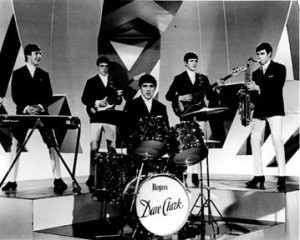
‘People should remember him for his music and the happiness he brought to the world. Freddie’s love was for life and living life to the full.’
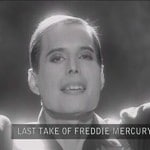
But then Freddie Mercury was always ahead of his time.
by Wallace McTavish

